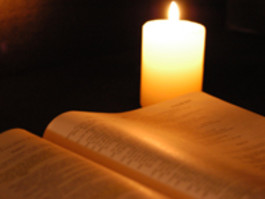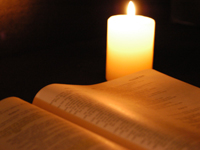Miss Your Cell Phone?

 MISS YOUR CELL PHONE? I read historian Benson Bobrick’s fascinating Wide as the Waters: The Story of the English Bible and the Revolution It Inspired. It’s the story of two English reformers—John Wycliffe, the brilliant Oxford scholar and Bible translator, remembered as “the Morning Star of the Reformation”; and martyr William Tyndale, whose English translation of Holy Scripture led to the King James Version and made the English Bible (next to the Bible itself) “the most influential book ever published.”
MISS YOUR CELL PHONE? I read historian Benson Bobrick’s fascinating Wide as the Waters: The Story of the English Bible and the Revolution It Inspired. It’s the story of two English reformers—John Wycliffe, the brilliant Oxford scholar and Bible translator, remembered as “the Morning Star of the Reformation”; and martyr William Tyndale, whose English translation of Holy Scripture led to the King James Version and made the English Bible (next to the Bible itself) “the most influential book ever published.”
The profound impression Bobrick’s history has left with me is the immensity of the debt we owe to these who sacrificed all so that we might possess our English Bibles today. So bright was the mind of Wycliffe that “even his later enemies agreed (as one confessed) that he was ‘second to none in philosophy, unrivalled in the Schools, and the flower of Oxford. Many divines esteemed him little less than a god.’ He wrote many works in Latin as well as English . . . and his theological tomes were as knotty and learned as those by any scholiast. One weary Czech scribe, copying out a section, exclaimed in the margin, ‘Dear God, help me to finish this work as quickly as I can’” (27). William Tyndale, from the protective cover of Holland, sent copies of his own English translation across the channel into England, and quietly the seeds of an eventual revolution—both spiritual and political—were sown. Not without price. On October 6, 1536, he was "brought forth to the place of execution, tied to a stake, strangled first by the hangman, then ‘with fire consumed.’ Before he lost consciousness, he cried ‘with a fervent zeal and a loud voice: “Lord, open the King of England’s eyes”’” (135).
At what price we possess our English Bibles this Thanksgiving! And yet are we really that thankful? Some dear soul forwarded to me a forwarded-forwarded-forwarded email (you know the type) with the simple query—“Ever wonder what would happen if we treated our Bible like we treat our cell phone?” Now the FW’ed piece had my attention. “What if we carried it around in our purses or pockets? What if we flipped through it several time a day? What if we turned back to go get it if we forgot it?” (That strikes home, because how many times have I remembered a couple blocks from home my cell phone back at the house? Leave it at home—are you kidding? I slam on my breaks, pull a quick U-turn—because I can’t live without my cell phone!) “What if we used it to receive messages from the text? What if we gave it to kids as gifts? What if we used it when we traveled? What if we used it in case of emergency?”
A century before cell phones Ellen White wrote: “The Bible is God's voice speaking to us, just as surely as if we could hear it with our ears. If we realized this, with what awe we would open God's Word and with what earnestness we would search its precepts. The reading and contemplation of the Scriptures would be regarded as an audience with the Infinite One” (My Life Today 283).
Then this Thanksgiving—even as we sing in the language of the old King James, “Come, ye thankful people, come”—shall we not fervently thank God for the inestimable gift of His Book?